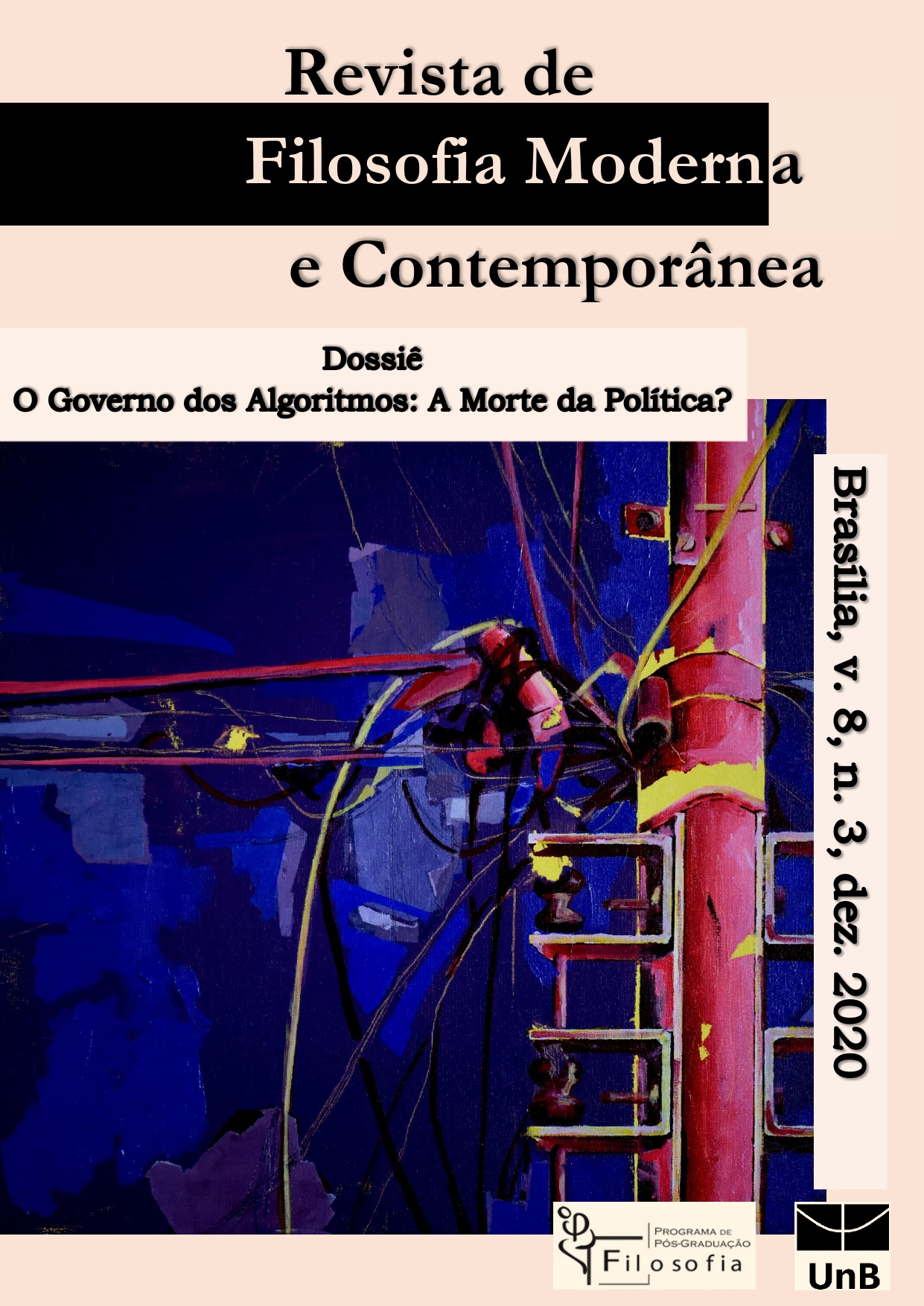Violações de Privacidade de Ordem Zero e Tomada de Decisão Automatizada sobre Indivíduos
DOI:
https://doi.org/10.26512/rfmc.v8i3.34503Palavras-chave:
Violações de Privacidade de Ordem Zero. Privacidade. Agentes Artificiais. Dados. Informação.Resumo
Neste artigo, é apresentada a noção de violação de privacidade de ordem zero como uma prática fundadora dentro de um novo tipo de exploração humana, a saber, o colonialismo de dados: a apropriação massiva da vida social através da extração de dados, adquirindo “território” digital e recursos dos quais pode ser extraído valor econômico pelo capital (Couldry & Mejias, 2019). A princípio, alego que as violações de privacidade não dependem da natureza dos agentes envolvidos. Os robôs leem seu e-mail, e não ter pessoas envolvidas no processo não o torna menos violento. Considera-se que o fluxo de dados coletados é melhor compreendido como uma mercadoria quando os padrões de dados limpos, bem formados e significativos são respeitados. Em seguida, sugere-se que cenários como a pandemia do covid-19 sejam um caso perfeito para expandir a vigilância por meio de aplicativos de rastreamento. Empresas e governos com tendências pré-existentes ao sigilo, autoritarismo capacitado pela tecnologia, e austeridade capitalizam estratégias de desinformação. Finalmente, são feitas observações sobre o valor da criptografia e exclusão estratégica como medidas para reforçar a privacidade.
Downloads
Referências
Austin, L. (2003). “Privacy and the Question of Technology”. Law and Philosophy 22:119-166.
Cohen, Julie E. 2018. “The Biopolitical Public Domain: The Legal Construction of the Surveillance Economy.” Philosophy & Technology. 31 (2): 213”“33.
Couldry, N.; Meijas, U. (2019). The Costs of Connection: How data is colonizing human life and appropriating it for capitalism. Stanford University Press.
Caliskan, Aylin; Bryson, Joanna J.; Narayanan, Arvind. (2017). “Semantics derived automatically from language corpora contain human-like biases”. Science. 356 (6334): 183”“186. arXiv:1608.07187.
Dowrk, C.; Roth, A. (2014). “The Algorithmic Foundations of Differential Privacy”. Nos. Vol. 09 3-4:211-417.
Etzioni, A. (2014). “A Cyber Age Privacy Doctrine: A Liberal Communitarian Approach”. I/S Journal of Law and Policy for the Information Society, 10 (2):641-669.
De Rizzo, J. (2020). “Grounding grounds necessity”. Analysis. anz083.
Fine, K. (2012). Guide to ground. In Metaphysical Grounding: Understanding the Structure of Reality, eds. F. Correia and B. Schnieder, 37”“80. Cambridge: Cambridge University Press.
Fine, K. 2017. A theory of truthmaker content I: conjunction, disjunction and negation.
Journal of Philosophical Logic 46: 625”“74.
Floridi, L. (2004). “Outline of a Theory of Strongly Semantic Information”. Minds and Machines 14: 197.
Floridi, L. (2014). The 4th Revolution: How Infosphere is Reshaping Human Reality. Oxford University Press.
Frey, S. (2018, July 3). Ensuring your security and privacy within Gmail [blog post]. Retrieved from https://www.blog.google/technology/safety-security/ensuring-your-security-and-privacy-within-gmail.
Jackson, Matthew O.; Morelli, Massimo (2011). "The Reasons for Wars ”“ an Updated Survey". In Coyne, Chris J.; Mathers, Rachel L. (eds.). The Handbook on the Political Economy of War. Edward Elgar Publishing.
Kleinman, Z. (2018, March 20). Cambridge Analytica: The data firm's global influence. Retrieved from https://www.bbc.com/news/world-43476762.
Lessig, L. (2006). Code: version 2.0, Basic Books, New York.
Liu et al. (2020). “Evolving Normalization-Activation Layers”, Machine Learning, arXiv:2004.02967 [cs.LG].
Parrales et al. (2016). “DNAJA1 controls the fate of misfolded mutant p53 through the mevalonate pathway”. Nature Cell Biology, 18 (11): 1233.
Pyysalo et al. 2020. “WikiBERT models: deep transfer learning for many languages”. Computation and Language, arXiv:2006.01538 [cs.CL].
Snowden. E. (2015). Just days left to kill mass surveillance under Section 215 of the Patriot Act. We are Edward Snowden and the ACLU's Jameel Jaffer. AUA. ”¢ /r/IAmA”. Reddit. Retrieved at https://www.reddit.com/r/IAmA/comments/36ru89/just_days_left_to_kill_mass_surveillance_under
Vedula et al. (2020). “Automatic Discovery of Novel Intents & Domains from Text Utterances”. Computation and Language, arXiv:2006.01208 [cs.CL].
Warren & Brandeis. (1890). “The Right To Privacy”. Harvard Law Review. Vol. IV, 5.
Westin, A. (1968). Privacy and Freedom (Fifth ed.). Atheneum, New York.
https://en.wikipedia.org/wiki/Olmstead_v._United_States Retrieved 12-07-2020.
Downloads
Publicado
Como Citar
Edição
Seção
Licença
Copyright (c) 2021 Revista de Filosofia Moderna e Contemporânea

Este trabalho está licenciado sob uma licença Creative Commons Attribution-NonCommercial-NoDerivatives 4.0 International License.
Direitos Autorais para artigos publicados nesta revista são do autor, com direitos da primeira publicação para a revista. Em virtude dos artigos aparecerem nesta revista de acesso público, os artigos são de uso gratuito, com atribuições próprias, em aplicações educacionais e não-comerciais.


